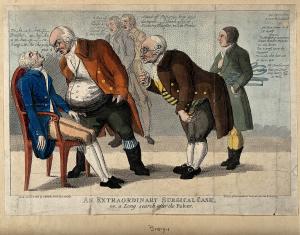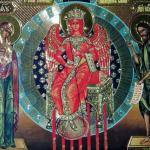 “My son, beware of anything beyond these. Of making many books there is no end, and much study is a weariness of the flesh” (Eccl. 12:12 RSV). Likewise, the asking of questions to texts already written, there is also going to be no end; these questions are the foundation for commentaries and responses which lead to and establish more books. While much good can come from such a pursuit, we must also be cautious and not use such questions and commentaries to denigrate or turn us aside from the truth as well. Questions can be a burden to others; they can be misleading, distorting or hiding the truth through an ideological agenda which diverts attention from what it should be and instead leads us to side-paths which are unseemly and dangerous to all.
“My son, beware of anything beyond these. Of making many books there is no end, and much study is a weariness of the flesh” (Eccl. 12:12 RSV). Likewise, the asking of questions to texts already written, there is also going to be no end; these questions are the foundation for commentaries and responses which lead to and establish more books. While much good can come from such a pursuit, we must also be cautious and not use such questions and commentaries to denigrate or turn us aside from the truth as well. Questions can be a burden to others; they can be misleading, distorting or hiding the truth through an ideological agenda which diverts attention from what it should be and instead leads us to side-paths which are unseemly and dangerous to all.
It is easy to grow weary at the attempts of philosophers and theologians to construct a thorough presentation of the truth and of our moral responsibility in the world. What might first seem certain and true, and so attract our attention and desire to follow with what we have heard, will prove to be partial and incomplete. The more we explore the truth, the more we discern we yet to attain of it. This gives room for ideologues who want to simplify the truth to fit their ideology to declare they have a simple and honest presentation which avoids confusion, and so, like the sirens of old, lead people away from the fullness of the truth as they proclaim all others, in their complexity, have caused great confusion and weariness to those desiring the truth. They think they can set up and proclaim the truth in a simple fashion in and with words, never realizing that even what they say will slowly unravel and demonstrate its incomplete nature, and someone else will eventually come and say they hold the simple truth which has been lost due to the confusion which has emerged. The truth transcends words, and to try to put it down in words, and to stand by the letter of those words instead of the spirit behind them, will always allow for someone to cause a panic and suggest that what was said is confusing and wrong.
There is a time in which the only response to questioning is silence. People who try to create scandal, who try to challenge authorities by twisting the words used so as to make them mean something different from their intended meaning, show that in and through their lack of charity, they seek useless quarrels for the sake of personal gain. “Have nothing to do with stupid, senseless controversies; you know that they breed quarrels” (2 Tim. 2:23 RSV). Such controversies come out of those possessing a great and arrogant pride; those seeking to be recognized and honored are angered when they seem not to receive it, and so they stir up conflict, hoping to establish themselves as great in the eyes of others as they think they take down the authorities they contend against. In their actions, they have already lost sight of the truth as they seek glory; they have lost charity as they seek to receive accolades instead of seeking to give what others truly need. “A hot-tempered man stirs up strife, but he who is slow to anger quiets contention. The way of a sluggard is overgrown with thorns, but the path of the upright is a level highway” (Prov. 15:18 – 19 RSV). The answer to such debates, then, is not always found in words; often the silence of the authority is in itself the charitable answer, hoping to let the controversy die down and those who had gone astray find their way back since they are not met with equally hostile words. The true leader will follow the Apostle John, who said, “Little children, let us not love in word or speech but in deed and in truth” (1 Jn. 3:18 RSV).
Once an answer has been established, those who seek quarrels will find it, while those who seek for peace will seek for the way by which the truth can be discerned in such words. For example, when St. Cyril condemned Nestorius, Cyril received criticism by some other bishops, suggesting that his words were confusing. How could he say Mary is the Mother of God? Was he suggesting that the Father was born of Mary? Was he suggesting God changed his nature and become some sort of mixture of God and man to be born of Mary? Words, and more words, were sought to defend Nestorius, seeking to suggest Cyril was the one who was confused. And even if, at times, his vocabulary itself is what caused the problems, reading behind the word and to their clear intent, it was easy to see what he was stating: God the Son assumed humanity without change to his divinity, and so became man, born of the Virgin Mary; as one whole person, he kept what is natural to both divinity and humanity intact and without mixture. No matter how many times he would write to answer his critics, they kept suggesting he was being unclear and confusing. Since there was a schism in the church, with those supporting Nestorius claiming St. Cyril was in the wrong, to bring peace to the church, many suggested they would be willing to follow the Council of Ephesus and approve of its denunciation of Nestorius if Cyril’s writings were also rejected and destroyed because they said Cyril caused grief and pain by confusing the church with his words. St. Cyril would have none of it; he was willing to welcome peace with those who did not sign the decree at Ephesus so long as they affirm the spirit of its teachings, that Jesus Christ is seen as the one Lord who is both God and Man, and that Nestorius, in rejecting the unity of Christ, was rightfully deposed. Eventually, St. Cyril was to receive what he wished:
Since, therefore, peace concerning the churches became a necessary anxiety for the most pious emperors, we ourselves are also praying that there may disappear from our midst the wall dividing us and severing us unto discord. We pray that the peace which is most pleasing to God may blaze up like light, since John, the most God-loving and most God-fearing Bishop of the Church of Antioch, and the most pious bishops with him have agreed in writing that they hold Nestorius deposed, and that they anathematize his unholy blasphemies. I have sent letters of communion to his reverence and to the other bishops. We joined in unanimity since your holiness and all the other bishops, who constituted the entirely of the holy council, concur in this. Strife and discord do not prevail with us. We all have had the one intention, which looks towards peace. If indeed they who in the beginning disagreed with us and severed themselves from us had desired it, there should not have been any strife and separation among the churches at all.[1]
St. Cyril of Alexandria, despite those who sought to denounce him and suggest he was the author of confusion, understood that a schism had occurred at Ephesus. Several Bishops, such as John of Antioch, did not sign its decrees, and had a council of their own which denounced and deposed Cyril instead of Nestorius. The schism was understood by both sides, and the battle of words led to the emperors to seek a way to bring peace back between the different sides of the debate. There was a struggle, but in the end, what was recognized is that those who signed documents against Cyril had to renounce their claims and accept what Ephesus, and therefore ecclesial authority, had determined; they had, in their agreement with those who opposed to Cyril, found themselves bound to a schismatic wing of the church until they had come to terms and accept Cyril’s doctrinal declarations by recognizing the meaning which was behind his teaching – a meaning which was not hard to discern when his works were read with the intent to understand, but could be lost with useless arguments if the choice of words which he used remained the focus.
Likewise, or especially, when dealing with moral questions and the pastoral approach to tough moral dilemmas, questions easily can arise. As grace perfects nature, mercy must lie behind the application of disciplinary rules and regulations so they do not become legalistic restrictions which destroy the spirit through the letter that kills. In the Christian East, the concept of economia is often used to address complex, pastoral questions which might not be easily answered, if ever answerable, by ecclesial authorities. God’s grace is sufficient to deal with irregular situations; the objective standards remains, but the subjective application of those standards must be met in a fashion that brings out and restores the good thanks to the bountiful grace of God. Instead of seeking to restrict the Word through needless legalistic questions in regards sinners, we must be like Paul, seeking to spread the bounty of God’s grace, willing to forgive and restore to communion those who have failed to live up to the expectations of God’s love. When we read of those who objectively done wrong but because of subjective, personal conditions, are said to be guiltless, the objective standard is not ignored, but rather is affirmed even as mercy and grace is also affirmed. Thus, when we read Pope St Leo the Great talking about women who have had a second husband, we should not be surprised he can find times in which they are said to be guiltless, such as during times of war when the woman thought their husband was killed but were only taken prisoner. If the wife remarried, thinking she were a widow, she did not sin, nor did those who married her. And yet, the question which must be asked is what happens if the husband is set free and returns? Leo’s answer is this:
And, therefore, if husbands who have returned after a long captivity still feel such affection for their wives as to desire them to return to partnership , that, which necessity brought about, must be passed over and judged blameless and the demands of fidelity satisfied.[2]
While it is almost taken for granted that the wife will return to her original husband, because he will want to return to her, and so the second marriage cast aside, this passage and the letter as a whole leaves a gap as to what happens if and when the husband returns, he does not desire to return to his marriage. Those who seek to cut apart and take away the mercy and grace of God in pastoral stewardship could use this as a way to decry Pope St. Leo the Great, suggesting that he has caused confusion to the faith since he left an opening for her to remain with her second husband while the first lives. What would we make if someone decried Leo for being unclear and causing confusion if they went together and joined in with those who did not recognize Leo’s authority, such as various Arian bishops, writing together with the Arians why Leo must be rejected as a material heretic? Would they not be deemed as joining in with the Arians against the church, and therefore, formally separated themselves from it? That is exactly how, throughout the centuries, the church has taken such letters. Even if someone as important as the writer of the Nicene Creed, Ossius of Cordova, was forced to sign a decree against their will, their signature was looked with suspicion and only after they denounced their signature would their position in the church be restored (as it was with Ossius). Those, therefore, who join in with arguments against legitimate authorities in the church by signing documents against those authorities by rival claimants for authority, such as by putting their signatures on documents created by and affirmed by some schismatic group, can be seen as having formally stated their communion with the schismatic side and placed themselves into schism unless they formally denounce their actions and affirm what they have failed to affirm once they are shown what they have done.
This is why those who, following the so-called Dubia, claim to correct the Pope with their letters of complaint, bring disturbance to the faithful; they speak against the proper teaching of mercy, grace, and justice, and so must be seen as the true authors of confusion. They are the ones who need to reconsider their actions, because the judgments they make now will end up standing against them. Those who decry mercy shall find their judgment brought back against themselves; they will receive what they proclaim for others: no mercy, at least as long as they hold out against such mercy for all. Let us pray they will correct themselves and leave us no doubt of their conversion, so we can once again join in a communion of love with them.
[Image=A gagging man surrounded by confused consultants from 1800 [CC BY 4.0 (http://creativecommons.org/licenses/by/4.0)], via Wikimedia Commons]
[1] St. Cyril of Alexandria, “Letter 49” in St. Cyril of Alexandria: Letters 1-50. Trans. John I. McEnerney (Washington, DC: CUA Press, 1985), 210-11.
[2] Pope St. Leo the Great, “Letter 159” in NPNF2(12): 103.
Stay in touch! Like A Little Bit of Nothing on Facebook












